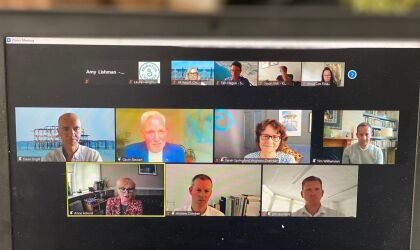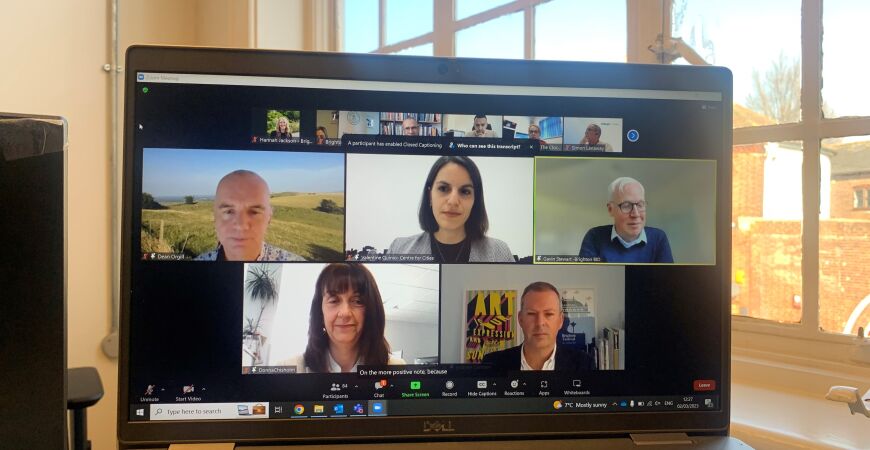

Wed 08 / 03 / 23
City Event: Brighton’s economy – what's ahead?
Flo Powell from Midnight Communications writes after Brighton Chamber's latest City Event, looking at what successes we can celebrate from the past year, but also what challenges lie ahead for Brighton's economy.
By Flo Powell of Midnight Communications
What are the challenges and opportunities facing Brighton’s economy? More than 100 people attended Brighton Chamber’s recent City Event on 2 March to listen from experts and discuss the future of our great city.
Chaired by Dean Orgill, Chief Executive Partner at Mayo Wynne Baxter and Chair of Brighton & Hove Economic Partnership (BHEP), the panel delivered a huge amount of insight and plenty of positives, with a cautious eye on the cost-of-living crisis, energy crisis and the changing nature of working practices since the pandemic.
Gavin Stewart, Executive Director at BHEP and CEO at Brighton BID, shared insights into Brighton's current state of play. Brighton has a £7.1bn economy with 140,000 jobs and 17,000 businesses and is expected to be the fourth fastest growing city in the UK with a 1.1% annual GVA growth in 2023.
However, the city faces challenges, such as the cost-of-living and energy crises. The Public Sector is still the largest part of the local economy, followed by banking and finance, tourism, and retail.
The skills gap remains an issue, with 57.3% of people having reached NVQ Level 4 or above, resulting in entry-level job seekers struggling to find work. We have baristas with PHDs.
The city also faces challenges in housing affordability and gender pay gap. The population is growing, with a 1.4% increase from 2011 to 2021. Retail vacancy rates in the city are below the national average, but the city centre vacancy rate is starting to increase, causing concern.
A recent survey found that businesses, particularly small to medium sized businesses, are anxious about surviving due to high costs and reduced spending.
Donna Chisholm, Executive Director at Brighton & Hove City Council, discussed recent developments at Preston Barracks, Circus Street, Moda’s Hove build-to-rent scheme, Edward Street Quarter and others, which are expected to have a positive economic impact. However, true economic impact is only understood several years after completion.
Mixed-use schemes with residential, office and retail components are driving major commercial developments, but industrial and manufacturing space is still lacking in the city.
The council's persistent challenge is to provide affordable residential schemes as house prices are high above average salaries, causing people to move out of the city and slowing population growth.
To address employment and regeneration, the council is leading a £16m project on Black Rock to prepare the site for development and will soon be calling for developers to express interest. Kingsway to the Sea linear park also going onsite, costing £13m, Madeira Terraces restoration starting in 2023.
With diminishing central government grants, the council is relying on private funding or borrowing for its projects, which can be challenging when focused on social good rather than profit.
The council aims to balance high-quality commercial development with providing decent housing for local residents and sustainable jobs.
Brighton Dome & Festival's CEO, Andrew Comben, acknowledged there is a challenging year ahead, despite steady audience return. However, the reopening of the Corn Exchange and Studio Theatre, in partnership with BHCC, Arts Council England, the LEP and others, is a major investment in the city's cultural assets. The restoration aims to make the buildings accessible to more people and run them sustainably financially and environmentally. The project is phase one of the Royal Pavilion Estate master plan, with more to come.
The immersive Van Gogh Alive installation will be the opening event, with increased seating capacity and new public foyers. The Brighton Festival in May is on sale, featuring Nabihah Iqbal as guest director and a range of free performances and outdoor events.
Brighton Dome & Festival is also partnering with Digital Catapult and Wired Sussex for five years on the Heritage XR project, a new project that explores how to engage audiences with heritage in new ways using new technology.
Book now for Brighton Chamber’s Van Gogh live breakfast event!
Valentine Quinio, Senior Analyst at Centre for Cities, shared insights from a recent report with relevant points for Brighton. Centre for Cities is a think tank focused on improving the economic performance of UK cities, with an annual Cities Outlook report as a health check for 63 areas.
Nationally, 1.2 million people are unemployed, but millions more are categorised as 'inactive'. This includes those who are in education or early retirement, but also those for whom inactivity is less likely to be a choice - for example if they're ill or discouraged from the labour market. Adding those 'forced inactive' to unemployment figures, Brighton's rate jumps from 3.9% to 10.7%.
Housing costs are the main challenge to growth in Brighton. Despite this, Brighton's high skill level and focus on knowledge-intensive services are positive factors for economic growth. The city needs to balance retail and office space to attract businesses with high-paid jobs to continue growing the economy.
Panel discussion highlights:
- Gavin stated that they would be receiving support from central government looking at Western Road in particular. The High Street Task Force would provide best practice examples of how to support an area in decline and by working with Brighton BID and the City Council were looking at the best ways of supporting businesses on the road and finding out where there were gaps so they could maximise the space.
- Dean raised the issue of inward investment and the lack of an enterprise agency in Brighton & Hove. Donna responded that other areas had enterprise agencies that focused on inward investment, we don’t have that inward investment specialism, and she thought it was a real weakness for the economy. There was the assumption that Brighton didn't need it, and she disagreed. Gavin mentioned there is the beginnings of an inward investment desk at regional level.
- Valentine pointed out there was a general misunderstanding between the strength of the economy and the performance of the high street. Businesses fuel demand for the high street – we need to look at these two issues together rather than separately.
- They discussed housing needs, and Donna mentioned that there was a refresh of City Plan part one coming. There was huge demand for housing, but that was for affordable and social housing more than anything else, and they were pressing developers strongly on that. That target was 660 homes per year, which they were exceeding, but the city needs more. The city has a lot of projects in prospect and on-site and recent major planning consent. It has to be the right sort of housing and housing that people could afford.
- They also discussed that the quality of office space was just as important as quantity. Valentine stated that they were still seeing lots of people going to the office and needing space, but the approach to office space had changed, and the demand for 1970s old stock was reducing. The way people work has changed, so we need more collaborative spaces available for coworking.
- Donna mentioned that we need to ensure we have a vibrant city that attracts visitors with the expectation they would spend with local businesses while they are here.
- Regarding net zero, Valentine said that a lot of transition to net zero would have to be on the way people travel to work and the way they heat their homes. Brighton was doing well on those aspects compared to other cities. It was much easier to use public transport and to use active travel such as cycling and walking. There was a lot to learn from other cities, such as clean air zones.
Everyone wants to see the best for Brighton & Hove and we’ll get there if we continue to communicate and collaborate. Watch this space for communications from Brighton Chamber!
Flo Powell is Joint-MD of Midnight Communications, a PR agency based in Brighton. Find out more about Midnight on their website here.
With thanks to our chair and panellists for joining the City Event to share their thoughts and insights.
To find more topical events from Brighton Chamber, head over to our events page.
If you want to contribute to the Chamber blog, contact us on hannah@brightonchamber.co.uk



